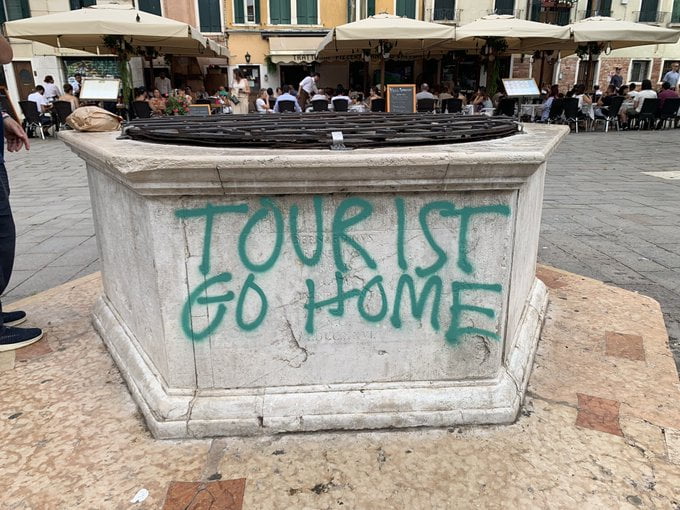Holiday hotspots worldwide – from the Canary Islands in Spain to St Ives in Cornwall – are annually overwhelmed with tourists, making these places inhospitable for residents.
Locals are beginning to fight back, however, and point the finger at the real enemy: capitalism.
Across Europe, thousands have taken to the street to protest against the extremes of mass tourism.
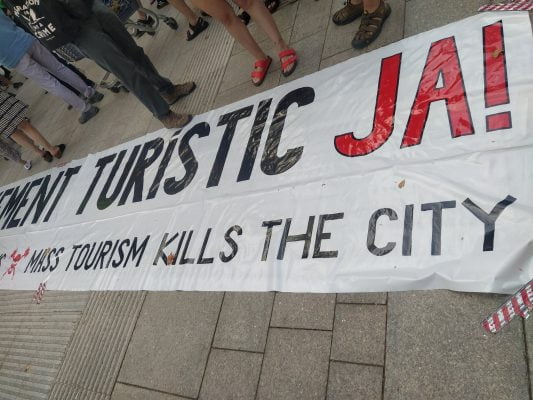
The phenomenon dubbed ‘overtourism’ has serious consequences for locals and the environment. In many cases, it makes living in these locations untenable, or harms the very landscapes and scenery that attracts visitors in the first place.
In the Canary Islands, for example, 34 percent of inhabitants are at risk of poverty, and the unemployment rate is 17 percent.
It is no surprise then that, in April, tens of thousands of people demonstrated across the eight islands, under the slogan “the Canaries have a limit” – protesting against a model of tourism that prioritises the capitalists’ profits at the expense of residents’ well-being.
Precarious conditions
Tourism is big business, accounting for three percent of global GDP. For countries like Spain, whose economies are more reliant on tourism, this rises to 13 percent.
The sector brings in revenue for local businesses and provides workers with jobs. In the summer of 2023, Spain’s hospitality sector employed a record figure of 1.9 million employees.
For the overwhelming majority, however, work in the tourist industry consists of low pay, long hours, and precarious seasonal work.
The fragmentation of the sector into small companies, with little union presence, meanwhile, means that most employers are able to hire workers on wages that provide only minimum levels of subsistence.
Environmental impact

Things are no better on the environmental front. The tourism industry is estimated to be responsible for around eight percent of greenhouse gases worldwide, mainly from transport. In countries dependent upon tourism, this figure almost doubles.
Overtourism can easily degrade unique natural or historic sites. In the Altamira cave in Northern Spain, for example, ancient paintings have been damaged by rising temperatures, caused by high densities of sightseers.
Similarly, Venice has been subject to the stresses of flooding, strained water supplies, improper drainage, and pollution. The Venetian lagoon is rising at roughly half a centimetre a year, meaning that by 2150 parts of the city will be underwater.
In popular urban destinations, housing has been eaten up by real estate vultures, driving up rents by 50 or even 60 percent in just a few years. Entire residential complexes and communities have been turfed out as a result.
This process of ‘gentrification’ also has consequences for the local economy in these neighbourhoods. Traditional small shops and family-owned businesses disappear, and are replaced by well-known restaurant franchises and fast-food outlets.
This – alongside loud, late-night partying, alcoholism, and other unsavoury activities – has led to ‘tourismphobia’ amongst locals in many places.
Capitalism to blame
Marti Cuso, a protest organiser from Barcelona, rightly blames big business and their political representatives, rather than individual tourists themselves.
Thousands of anti-tourism activists marched in #Spain‘s Palma de Mallorca in the demonstration against ‘tourism model’. Anti-tourism activists staged a series of protests, saying visitors drive up housing costs and lead to residents being unable to afford to live in city centres. pic.twitter.com/2DArvonQUB
— Atulkrishan (@iAtulKrishan1) July 22, 2024
“The responsibility lies with the tourism industry and governments that have allowed the industry to do whatever it wants,” Cuso says in an interview with the Financial Times. “What has marked Barcelona is the violence of tourism in the way it occupies public spaces, privatises things, and expels people.”
In response to protests about overtourism, capitalist governments have been taking measures to push the costs onto holidaymakers. Barcelona is increasing its hotel tax and has banned AirBnb rentals. Venice has introduced a tokenistic five euro entry fee.
Similarly, liberal mouthpieces like The Economist have a simple solution: let the market decide who can go on vacation, by hiking travel and accommodation prices to curb demand. In other words, make tourism a preserve of the rich.
Planning and control
Putting the obvious inequities of these proposals aside, all these suggestions skirt around the main issue: Who owns and controls the tourism industry? And in whose interests does it operate?
Under capitalism, formerly serene spaces – and their inhabitants – are treated by ravenous bosses as little more than sources of private profit.
All the wealth in society comes from nature and human labour. And the capitalists want to suck up and hoard this for themselves.
The protests against overtourism seen across Europe therefore reflect a healthy instinct amongst workers and local residents against this rampant exploitation.
It is the profit motive and the anarchy of the market that are responsible for destroying our lives and livelihoods; our communities, cities, and surroundings.
We must therefore tackle this problem at its root. This means seizing control of the tourism industry – including AirBnb, the giant hotel chains, the big booking agencies, and all the major travel businesses – and placing these under the democratic and rational control of the working class.
Furthermore, land should be put under public ownership, as should important heritage sites, in order to ensure sustainable practices and harmonious development.
Only on the basis of socialist planning and workers’ control can we organise tourism to benefit the whole of humanity, and to preserve the natural beauty and cultural traditions that drive us to explore the world.
The Paris Olympics – Macron’s bread and circuses
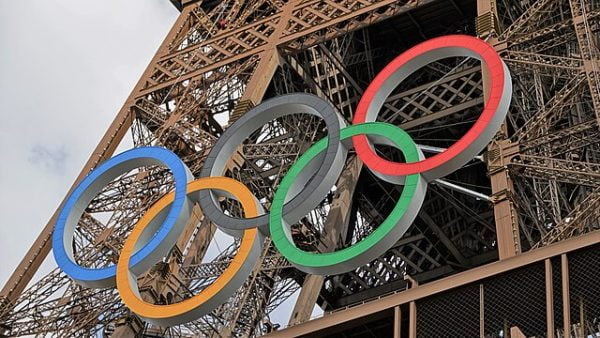
I was lucky enough to attend an event at the Olympics in Paris. While not taking anything away from the athletes, who I thought showed immense determination, bravery, and skill, I had some wider observations.
Surrounded by mostly well-heeled fans from wealthy European countries, I stood in an area outside the stadium where fans were enjoying a celebratory atmosphere.
It was impossible not to notice, however, that this stadium – located in a working-class area of northern Paris – was surrounded on all sides by the high rise blocks of ‘les banlieues’: deprived neighbourhoods surrounding the city centre.
The games took place at a time of major political upheaval in France. While French workers suffer brutal attacks at the hands of Emmanuel Macron and the ruling class, it is clear that no expense was spared on hosting the Olympics.
This was the ultimate example of a ‘bread and circuses’ spectacle: an opportunity for the French establishment to stage a sideshow; a helpful diversion to briefly distract from their crumbling system.
Andy R, Farringdon
Fuel tankering – the aviation industry’s dirty secret
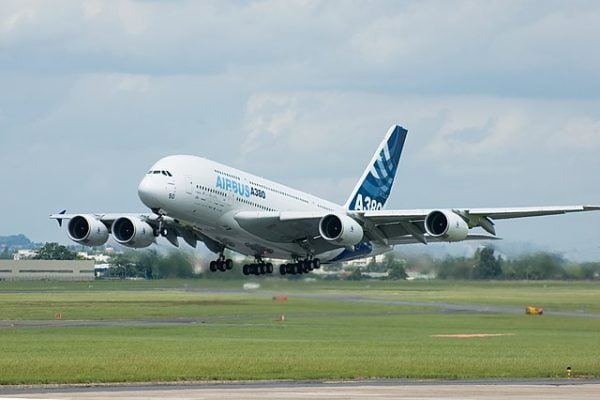
One of the dirty little secrets of the aviation industry is so-called ‘fuel tankering’. This is the practice of carrying more fuel than you need for a particular flight. Why would we – as pilots – do this?
Because the accountants in our company tell us to. Tankering is essentially a way to lower fuel costs, by refuelling at departures where prices are lower than at the destination.
We don’t really have a say in this. It is our paperwork telling us where to do this. These orders are produced by a piece of software taking into account things like fuel tankering amount, flight distances, velocities, winds, altitude, local fuel prices, payload, etc.
So what is the problem? Basic physics: because we take on more fuel than needed for a single trip (sometimes up to 10 tonnes, a significant amount for a single flight), our aircraft is heavier and requires more thrust. In turn, this means greater CO2 emissions into the atmosphere.
There is absolutely no need to tanker fuel, apart from maximising profit. Yet almost every single airline in the world is guilty of it. This is simply the nature of a cut-throat capitalist system, where profits come before the planet.
An airline pilot
Postcard from the seaside
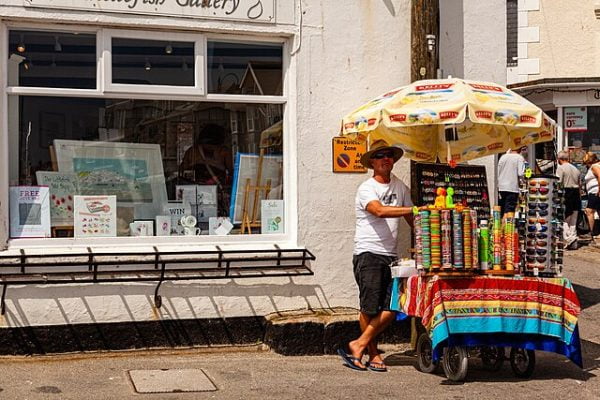
St Ives, Cornwall, is an extremely congested, no-go area for most of us in the summer season. But, as upsets go, tourism in itself is not the main issue. For local residents, the real problems are poverty and housing. These questions, however, are undoubtedly linked.
Tourism used to be a supplementary (and necessary) income for many families, who would offer ‘bed and breakfast’. As children, we accepted having to forfeit our bedrooms for the summer, sleeping in old caravans. And we learnt how to make countless pots of tea and master omelettes.
Then things changed. With the 1960s economic upswing, people switched to package hotel holidays. More lately, Airbnbs became a budget option. This inevitably puts pressure on the availability and cost of rented properties for locals.
This summer, tourism is down 10-20 percent. And that, together with ongoing and increased maintenance costs, has prompted the sale of many holiday lets – at prices still outside the reach of locals.
Many will become second homes to a wealthier, metropolitan tier, with dramatically reduced occupation throughout the year. This will further impact the local economy, leading to closed shops and services.
To condemn tourism in itself is lop-sided and unhelpful. Where I live, lots of lower-to-middle income families come to enjoy the beaches for a week. Do I begrudge them that? Nope!
Do the crowds bother me? Not as much as the very evident wealth inequality in Cornwall, where wages are on average 20 percent below the national average, and where poverty is widespread.
Jayne Pascoe, Cornwall

